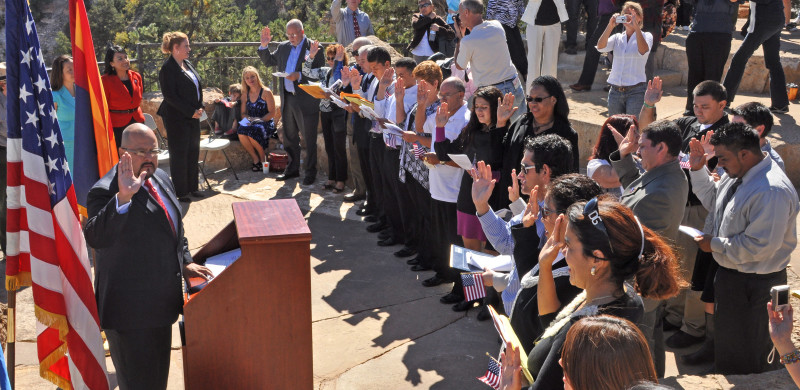
This past weekend we celebrated 239 years of American Independence. While some people were celebrating with burgers, fireworks, friends and family, many others were celebrating by becoming United States citizens. In honor of Independence Day, USCIS holds annual country-wide naturalization ceremonies to welcome these New Americans and to rejoice in their inclusion into the fabric of this country. Between July 1st and July 4th, 4,000 people took the Oath of Allegiance at these ceremonies and became United States citizens.
Many immigrants remain in the U.S. for years on Green Cards and various visas, but they will never have the benefits and security that comes with being an American unless they apply for naturalization. Naturalization is the process of becoming a citizen after fulfillment of requirements established by Congress in the Immigration and Nationality Act. If someone qualifies for citizenship, they will have to fill out an application, attend an interview, and pass an English and civics test. Applicants must prove their knowledge of spoken English and American government. This can seem a bit daunting, but after an application is submitted, USCIS sends the applicant a study guide with 100 questions, 10 of which will make up the civics exam. If the material is properly reviewed, there should be no problems. Once these actions are completed, the applicant takes an Oath of Allegiance, and becomes a citizen.
Current Oath:
-
I hereby declare, on oath, that I absolutely and entirely renounce and abjure all allegiance and fidelity to any foreign prince, potentate, state, or sovereignty of whom or which I have heretofore been a subject or citizen; that I will support and defend the Constitution and laws of the United States of America against all enemies, foreign and domestic; that I will bear true faith and allegiance to the same; that I will bear arms on behalf of the United States when required by the law; that I will perform noncombatant service in the Armed Forces of the United States when required by the law; that I will perform work of national importance under civilian direction when required by the law; and that I take this obligation freely without any mental reservation or purpose of evasion; so help me God.
There are many advantages to becoming an American citizen. With my clients I like to stress three of them:
Family: As a citizen, it is easier to petition for family members. Citizens can help overseas family members legally immigrate to the U.S.. Children under 18 years of age automatically become citizens when their parents become naturalized. In most cases, children of U.S. citizens who are born abroad are also automatically citizens.
Participation in Government: U.S. citizens have the right to vote. Green Card and visa holders can live in this country for years without ever having a say in the laws that govern their daily lives. Being a citizen also makes provides eligibility for government jobs. Citizens can be as involved in policy as they choose to be. Citizens can be part of progress.
Security: Citizens can not be deported. Non-citizens are always at risk. If a Green Card holder is convicted of an aggravated felony, a serious crime, or crimes related to controlled substances, Permanent Residency can be revoked and they could be deported. Citizens also qualify for U.S. passports which provide the protection of the U.S. government while traveling abroad.
My father immigrated to the States from Argentina in the early ‘70s. He often tells me the story of the day he became a citizen, and not only what it meant for him, but what he knew it would mean for the future of his family. As an immigration attorney, I revel in giving other families the same opportunities my father was able to give me. So, to all the 4,000 New Americans naturalized this past week:
Welcome! I look forward to seeing the progress we, as Americans, can make together!



